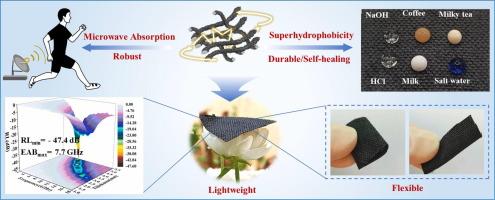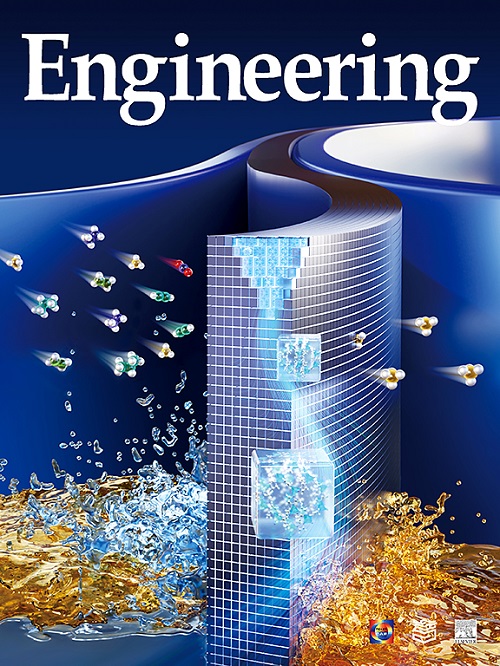Robust, Flexible, and Superhydrophobic Fabrics for High-Efficiency and Ultrawide-Band Microwave Absorption
IF 10.1
1区 工程技术
Q1 ENGINEERING, MULTIDISCIPLINARY
引用次数: 0
Abstract
Microwave absorption (MA) materials are essential for protecting against harmful electromagnetic radiation. In this study, highly efficient and ultrawide-band microwave-absorbing fabrics with superhydrophobic surface features were developed using a facile dip-coating method involving in situ graphene oxide (GO) reduction, deposition of TiO2 nanoparticles, and subsequent coating of a mixture of polydimethylsiloxane (PDMS) and octadecylamine (ODA) on polyester fabrics. Owing to the presence of hierarchically structured surfaces and low-surface-energy materials, the resultant reduced GO (rGO)/TiO2-ODA/PDMS-coated fabrics demonstrate superhydrophobicity with a water contact angle of 159° and sliding angle of 5°. Under the synergistic effects of conduction loss, interface polarization loss, and surface roughness topography, the optimized fabrics show excellent microwave absorbing performances with a minimum reflection loss (RLmin) of −47.4 dB and a maximum effective absorption bandwidth (EABmax) of 7.7 GHz at a small rGO loading of 6.9 wt%. In addition, the rGO/TiO2-ODA/PDMS coating was robust, and the coated fabrics could withstand repeated washing, soiling, long-term ultraviolet irradiation, and chemical attacks without losing their superhydrophobicity and MA properties. Moreover, the coating imparts self-healing properties to the fabrics. This study provides a promising and effective route for the development of robust and flexible materials with microwave-absorbing properties.

用于高效和超宽带微波吸收的坚固、柔韧和超疏水织物
微波吸收(MA)材料对于抵御有害电磁辐射至关重要。本研究采用一种简便的浸涂方法,包括原位还原氧化石墨烯(GO)、沉积二氧化钛(TiO2)纳米颗粒,以及随后在聚酯织物上涂覆聚二甲基硅氧烷(PDMS)和十八胺(ODA)混合物,开发出了具有超疏水表面特征的高效超宽带微波吸收织物。由于存在分层结构表面和低表面能材料,还原 GO(rGO)/TiO2-ODA/PDMS 涂层织物具有超疏水性,水接触角为 159°,滑动角为 5°。在传导损耗、界面极化损耗和表面粗糙度形貌的协同作用下,优化织物显示出优异的微波吸收性能,在较小的 rGO 负载(6.9 wt%)条件下,最小反射损耗 (RLmin) 为 -47.4 dB,最大有效吸收带宽 (EABmax) 为 7.7 GHz。此外,rGO/TiO2-ODA/PDMS 涂层非常坚固,涂层织物可经受反复洗涤、脏污、长期紫外线照射和化学侵蚀,而不会失去其超疏水性和 MA 特性。此外,涂层还赋予了织物自我修复的特性。这项研究为开发具有微波吸收特性的坚固柔性材料提供了一条前景广阔的有效途径。
本文章由计算机程序翻译,如有差异,请以英文原文为准。
求助全文
约1分钟内获得全文
求助全文
来源期刊

Engineering
Environmental Science-Environmental Engineering
自引率
1.60%
发文量
335
审稿时长
35 days
期刊介绍:
Engineering, an international open-access journal initiated by the Chinese Academy of Engineering (CAE) in 2015, serves as a distinguished platform for disseminating cutting-edge advancements in engineering R&D, sharing major research outputs, and highlighting key achievements worldwide. The journal's objectives encompass reporting progress in engineering science, fostering discussions on hot topics, addressing areas of interest, challenges, and prospects in engineering development, while considering human and environmental well-being and ethics in engineering. It aims to inspire breakthroughs and innovations with profound economic and social significance, propelling them to advanced international standards and transforming them into a new productive force. Ultimately, this endeavor seeks to bring about positive changes globally, benefit humanity, and shape a new future.
 求助内容:
求助内容: 应助结果提醒方式:
应助结果提醒方式:


